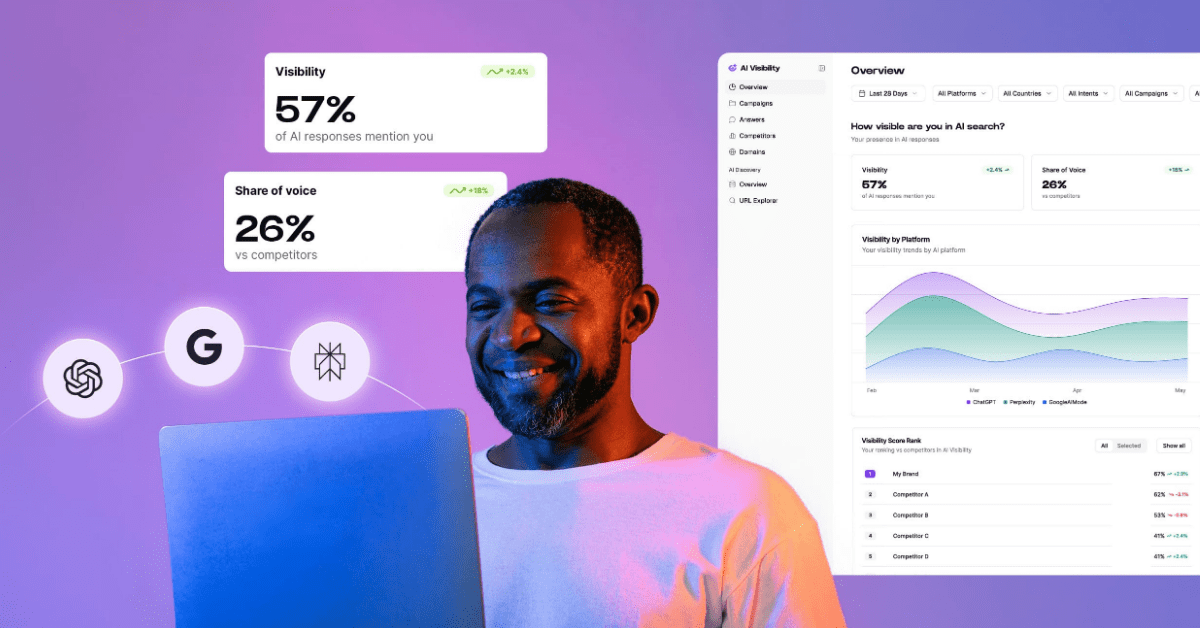
Note: We changed the name from compliant to indexable in Botify to reflect SEO industry terminology. Nothing has changed except the name.The folks at WebCertainTV have released another informative interview. In their latest video, David Carralon, Head of International SEO at CareerBuilder.com, offers top tips on discovering opportunities to improve technical SEO within your website's architecture, his preferred toolkit, and advice to help you ensure your recommendations are implemented.The full video is 16 minutes in length but one thing David praised (at the 9 minute mark) is, Botify's concept of Compliant URLs versus Non-Compliant URLs. David also compliments us on the reports we've been adding to the application over the past couple of months, calling them "game changers".
*"I use Botify, a French startup that arrived three to four years ago, and it's a great tool. I just like the whole way Botify deal with the concept of compliant URLs versus non-compliant URLs. And the crawler is based around that whole concept of compliance versus non-compliance. At the same time the reports they add to the tool are fantastic. They are real game changers. They have helped me to save so much time. I am able to see problems affecting specific corners of a website whereas before I had to download all the data first on a spreadsheet and work out the issues myself".* David Carralon, CareerBuilder.com
Click to watch the video:
Here is the full transcript:WebCertainTV: The technical aspects of SEO are just as important as the content on a website in terms of how well it will perform and achieve all of the business goals. So what do you think are the most fundamental and important aspects to get right when you're working on SEO?David: There are many, certainly, I would say that probably the most important technical fundamental is accessibility together with discoverability. Both fundamentals go together because of the need to make the full content of the website discoverable and fully accessible in order for it to be indexable. I'd say that is the main fundamental of dealing with large international websites.And when it comes to international websites there are obviously slightly different challenges, is there anything different to think about from a technical perspective?D.: The most important technical factors of dealing with large international website are first of all the need to have a solid, very well structured, technical architecture. You need to try and get the content properly structured with different categories and different layers of information and everything needs to be in the best possible way shallow, scannable and accessible. That's like I said earlier, that is one fundamental that's a very important technical factor.Another very important factor is the need to try and avoid having duplicate content. This is a very typical problem for large websites and are many different types of duplicate content. This can hamper the overall accessibility of the website and for the content to be discovered and obviously for the website to perform better with the search engines.So those two things are quite important together with the need to make your content accessible for mobile users as well and different devices. You need to ensure both mobile and desktop websites are interlinked together so that users on both platforms can find the correct information.From an international SEO point of view you need to make sure the website content structure is defined in a way that makes sense for your geo-targeting strategy. So, depending on factors such as budget, ambition, strategy, you might wish to define your website in one way or another, for example, ccTLD, folder structure, etc. and then ensure your hreflang tags are set up correctly.So, definitely a lot to think about.D.: There's definitely more to think about. Another example is sitemaps. Being able to have a good sitemap structure accompanying your website is also very important. And I say structure because often it's not just enough just to have a single sitemap file. If you are dealing with a really large website what you probably want is to have your sitemaps segmented so that each specific segment of your website is represented on a different sitemap. This gives you lots of visibility and flexibility to analyse your content and understand where your issues and errors are coming from. Having your sitemap well structured and well defined can help you track down a lot of issues.Audits are also a good way of doing that. So why is it important to run regular audits on your website?D.: It's very important to run regular audits. As time goes by there are many different teams touching the website and feeding information into the website. There are marketing campaigns going on, the technical platform changes, things change, the on-site conversion team within marketing are making changes as well. At some point quite a lot of people are touching the website and things can go wrong very quickly unless you keep up regular audits. Even if you are working with those teams you might not realise but as a result of something being implemented on the website, subdomains changing places, campaign landing pages not being moved correctly, the conversion rate optimization team making changes. It really helps you have a stronger and better visibility of what is going on with the website and identify and spot issues in order to go back and fix them. Also, the search engine landscape keeps changing and things are moving fast, so you often need to start doing things you weren't doing six months ago.What should you be looking for in these audits?D.: One of the most important things is to ensure every piece of unique content is sitting on a compliant URL - a URL that delivers a 200 http header message and there are no non-compliant pages (non-indexed, redirects, different canonicals, etc.), also server errors, for example a 521 server error that means there is an issue on certain pages, you may have a whole set of 404's being triggered by something happening on the website, you may have some issues with your sitemaps not being found on the structure, mobile issues, yeah, there's quite a lot to look for after a technical audit.What tools can you use to help with the technical audit process?D.: Things have changed dramatically over the last few years. About 10 years ago most Enterprise SEO's were using Xenu to crawl websites and it was doing a very good job. Then ScreamingFrog appeared on the landscape and everyone embraced that. They had great access to the data that every SEO was looking for. I used that a lot but truly when you're dealing with really large websites that crawler struggles because it is a desktop application. What you really need is a web based crawler. You need a product that can crawl a website in a timely manner (less than a day) and have much more visual representation and reports of your issues.I use Botify, a French startup that arrived three to four years ago, and it's a great tool. I just like the whole way Botify deal with the concept of compliant URLs versus non-compliant URLs. And the crawler is based around that whole concept of compliance versus non-compliance. At the same time the reports they add to the tool are fantastic. They are real game changers. They have helped me to save so much time. I am able to see problems affecting specific corners of a website whereas before I had to download all the data first on a spreadsheet and work out the issues myself. A couple of other tools I'm also using a lot more lately are SEMRush and Ahrefs. They are not actually considered site auditors but they have very good site auditing features and they have added some really good functionality in terms of website analysis so I have used that information to contrast the information I gain from Botify.
.@DavidCarralon, @CareerBuilder: "Botify is a great tool". Check out the interview: https://t.co/kowpTcBqp0 #SEO pic.twitter.com/Dnl3eiseJx
— Botify (@botify) 29 avril 2016
Conducting audits is the first step. How do you transfer what you find in the audits into actions?D.: This is probably the toughest part, to spot the issues and think oh wow, I got this whole number of redirects, redirect chains, I have this list of 404's. It's easy to jump to conclusions and just think I'll just deal with all these 404's and redirects on one category of the website. But, I think it best to take a little bit of time, and try to find out the reasons why the issues are actually there, reaching the root of the problem instead of precipitating into finding a solution for a few errors. It's about taking a holistic approach. Put the issues together and ask yourself why the issues are actually there. Think about lots of different solutions to think about which one you should go for first.How do you prioritize?D.: It's all about impact. What's going to have the biggest impact. If you're working on short term goals and more strategically and you want to have a set of actions being taken in order to get to a resolution then perhaps what you are looking for is perhaps a sequence in order to solve the issues in a coordinated manner and have a greater impact in the long term. It really depends what the business is after. Sometimes they are just after short-term gain. It's all a question of strategy.Another headache for SEOs for many years has been getting other people within the business, outside of the SEO, to really understand the impact and the importance of it. Do you think that's got better or do you think it's still a big challenge to make other people believe that it's an important investment?D.: I think it's got a lot better. A lot more people now understand the value of trying to get the SEO right on the website and there a lot more investment being put into SEO. There are a lot more marketing profiles required knowledge of SEO which is a good thing for the industry. In the last 2 to 3 years I've seen a whole set of new SEO jobs being created on LinkedIn and despite the general feeling that SEO is going to die at some point, what I actually see is something completely different. There are even more jobs than we saw 3 to 4 years ago. I think there is still good momentum for the industry.There are still some challenges of course and some things have still not changed for the better. For example I still see a hugely disproportionate amount of budget being allocated to paid search and paid advertising and often just a tiny bit for the SEO team, which is a shame because often you can demonstrate with figures that conversion rates are much greater with organic traffic than other forms of traffic. And yet, this is still an area that requires a lot of evangelizing. It's very easy for marketing teams to justify their spend on the quick returns in paid search whereas with SEO it can be tough, up to a year to show the value of expenditure. But generally the industry is in a much stronger position that 5 to 6 years ago.Managing SEO for a large and complex website has never been so difficult, but help is at hand. Try Botify to discover how you can increase your SEO traffic and revenue with great, actionable data.

.svg)



.svg)

.jpg)
.svg)
.svg)

